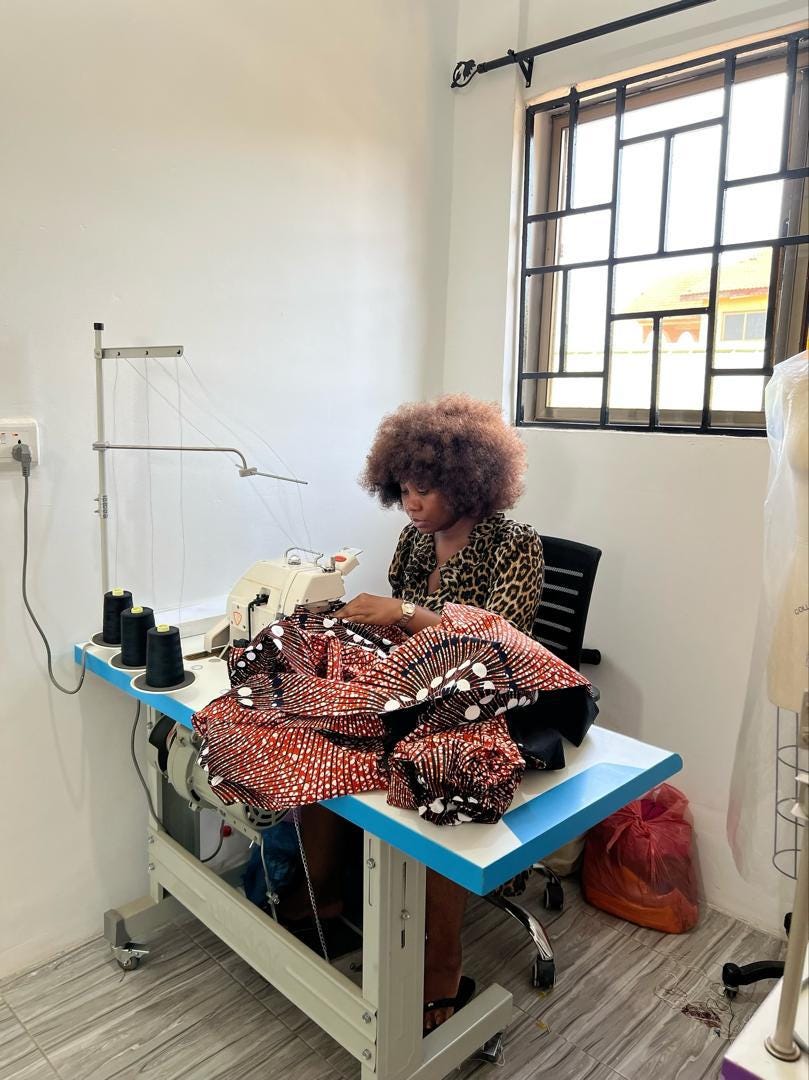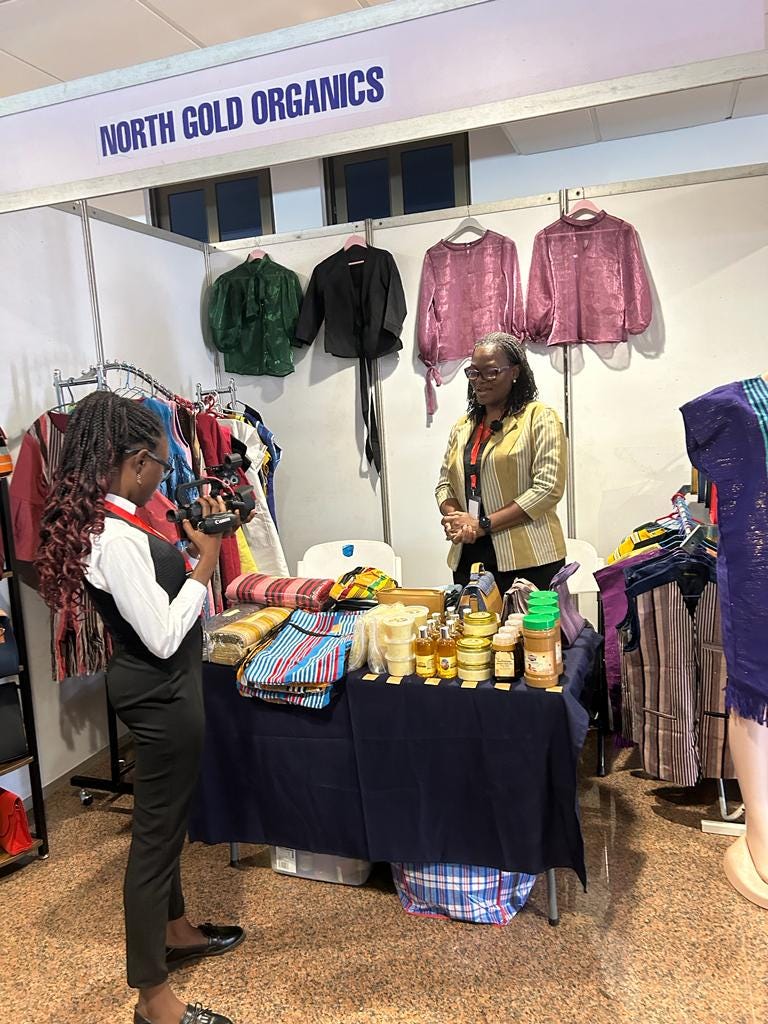Scaling Local Solutions
Ghanaian Entrepreneurs Show the Way
“I think we got the wrong idea of scale. We think of scale [as] — do one thing and hopefully it'll work for everyone with the variation automated. The alternative is that we instead scale the creation of locally responsive solutions.” – Alejandro Juárez Crawford
During a thought-provoking new episode of the Plucky Bamboo podcast, Alejandro Juárez Crawford gets right to the heart of what it takes to create flourishing business ecosystems in places like Ghana.
In the interview, Crawford quotes from his soon-to-be-released book One Size Fits None: Time for an Entrepreneurial Revolution, co-written with Miriam Plavin-Masterman. As a lecturer at the University of Professional Studies in Accra and a business coach dedicated to empowering students and informal sector entrepreneurs, I observe firsthand how traditional conceptions of "scale" frequently fail our communities. Crawford's idea of scaling locally responsive solutions is more than just a theory; it is a rallying cry for the kind of practical, grassroots creativity that is changing people's lives in Ghana.
My work as senior lecturer and SME industry coach at Ghana’s University of Professional Studies, focuses on making this vision a reality by assisting young entrepreneurs in developing ideas, cultivating an entrepreneurial mindset, and establishing firms that address real-world problems in their communities.
Redefining Scale in Ghana’s Entrepreneurial Landscape
In Ghana, the term "scale" frequently conjures up thoughts of multinational firms or tech startups pursuing worldwide markets with one-size-fits-all solutions. However, as Crawford points out, this strategy is rarely effective in communities with distinct issues and diversified demands. Ghana's entrepreneurial ecosystem is a bustling mix of market merchants, tech innovators, and small-scale manufacturers, all of whom face local challenges such as unpredictable power (dumsor), restricted access to cash, and fragmented markets. A blanket solution devised in a remote boardroom cannot address the intricacies of these situations. True scale, on the other hand, is achieved by empowering entrepreneurs to create solutions tailored to their specific contexts, solutions that ripple outward to transform communities.
At the University of Professional Studies, I deal with students who want to convert their ideas into businesses. Our MBA Impact Entrepreneurship and Innovation program encourages them to think locally first.
MBA alum Loretta Ata Tetteh, a fashion designer, saw that fabric leftovers from her sewing work accumulated and contributed to waste. Instead of using traditional disposal methods, she devised an innovative strategy for gathering and recycling waste materials into high-fashion gowns and smart workwear, transforming discarded textiles into sustainable, elegant designs.

Her company, LATAYYO Design and Fashion, now serves over 20 local retailers and individual customers, transforming textile waste into one-of-a-kind, environmentally-friendly fashion pieces. Loretta's tale indicates that scaling does not imply global growth; rather, it entails developing solutions that are so effective and relevant that they spontaneously gain hold in a community.
Practical Steps for Scaling Local Solutions
Crawford's vision inspires practical, actionable initiatives that we are executing in Ghana. Here's how we're getting it done:
Identifying Local Needs: Understanding the problem is crucial for every successful business. We train students and businesses to do "problem walks" in their communities, which involve physically traveling around markets, neighborhoods, or villages to discover pain points. For example, a group of students discovered that bad roads made it difficult for rural farmers to carry their produce to metropolitan markets. Their solution: a peer-to-peer logistics platform that connects farmers and local motorbike riders. This low-cost, community-driven solution is currently assisting farmers in the Volta Region to bring their products to market faster.
Utilizing Local Resources: Ghana has a wealth of human, environmental, and cultural resources that businesses can leverage. Mary Magdalene Anwabiri (MBA Alum) for example, is an entrepreneur who started a fashion line out of leftover smock cloth scraps. She collaborated with local tailors to produce a range of accessories currently offered in Accra's tourist markets, as pictured in the image below. Her company, North Gold Organics, not only eliminates waste but also highlights Ghanaian workmanship, demonstrating that local resources can produce scalable innovation.

Creating Digital Bridges: Technology is an effective enabler, but only when it is available. The MBA Impact Entrepreneurship and Innovation program teaches entrepreneurs how to reach customers using basic digital tools such as WhatsApp Business and Instagram.
Developing Collaborative Ecosystems: Collaboration is required when scaling local solutions. We collaborate with government agencies, non-governmental organizations (NGOs), and private sector partners to assist entrepreneurs with finance, mentorship, and market opportunities. Our incubator program, for example, connects companies with local investors that understand Ghana's specific difficulties.
A Vision for Ghana’s Future
Crawford's says his notion of scale was influenced both by his experience equipping others to build ecosystems around the world, and by the thinking of his colleague Michael Shuman, who teaches economics at the Bard MBA in Sustainability and publishes The Main Street Journal.
This way of looking at scale is transformative for Ghana. It's about developing a thousand tiny, effective answers rather than chasing one big, universal solution. At the University of Professional Studies, we're cultivating a generation of entrepreneurs that think like this. They're not waiting for the system to change; they're developing solutions that work now, for their people, and in their context.
Every day, as I coach my students and informal entrepreneurs, Crawford's remarks come back to mind. Scale isn't about imposing a single notion on everyone; it's about empowering everyone to generate ideas that benefit their communities. In Ghana, we're demonstrating that scaling local solutions builds more than just enterprises; it also builds optimism, resilience, and a brighter future.
![Aforla presents her Dzordzoe Skin Care line at a trade fair in Accra https://www.instagram.com/dzordzoeskincaregh/?hl=en] Aforla presents her Dzordzoe Skin Care line at a trade fair in Accra https://www.instagram.com/dzordzoeskincaregh/?hl=en]](https://substackcdn.com/image/fetch/$s_!veDh!,w_1456,c_limit,f_auto,q_auto:good,fl_progressive:steep/https%3A%2F%2Fsubstack-post-media.s3.amazonaws.com%2Fpublic%2Fimages%2Fb11d5895-d81c-4df4-9ef2-045b4d2f9d17_1200x1600.png)





